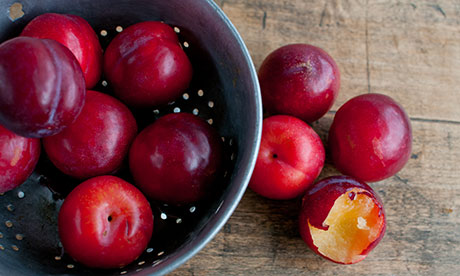
Hurrah, it's the season for English plums. In fact, it's the best time to eat plums, full stop. For most of the year, immature, squeaky-skinned bombs are lobbed in our direction from southern hemisphere growers, with supermarkets selling them as a "home ripening" component of those dispiriting fruit bowls built for ornamentation, not eating. But now we can sink our teeth into juicy, tender-skinned home-grown fruits, exploring heritage varieties, such as Victoria, Marjorie's Seedling, Yellow Pershore and Warwickshire Drooper, and seizing any opportunity to make a vivaciously purple compote, jam or paste with tart Westmorland and Yorkshire damsons.
Why are plums good for me?
Plums are low-calorie fruits with a low glycaemic index score. So even though they are sweet, eating plums isn't likely to cause unhealthy spikes in your blood sugar levels. They contain useful amounts of vitamin C, which fortifies the body's defences against infection and increases the amount of energy-giving iron that we absorb from food.
The phenolic compounds in plums, such as procyanidin, neochlorogenic acid and quercetin, seem to reduce inflammation and help neutralise oxygen damage to cells. In studies, red plums have been found to have a higher phenolic content than their yellow and green equivalents.
Where to buy and what to pay
Supermarkets habitually sell English plums picked while hopelessly under-ripe, so they often disappoint. Ready-to-eat plums do find their way to greengrocers and markets, and in growing areas such as Worcestershire, Herefordshire and Norfolk, you can buy them at orchard shops, or even pick your own. Guide price: £4 per kg.
Joanna Blythman is the author of What To Eat (Fourth Estate, £9.99). To order a copy for £7.99 with free UK p&p, go to guardianbookshop.co.uk
Plum sauce
This sauce is loosely based on Georgian plum sauce. Of all the recipes I have found, I like Diana Henry's best. It goes really well with barbecued meats.
Makes enough sauce to fill a jam jar
1 tbsp olive oil
1 banana shallot, sliced
3 garlic cloves, crushed
1 heaped tsp cayenne
1½ tsp ground coriander
50ml red wine vinegar
500g plums, halved and stoned
60g dried apricots
2 tbsp honey
150ml water
Juice of ½ lemon or sugar, to taste
4 sprigs dill, finely chopped
Handful coriander, chopped
Salt and black pepper
1 Heat the oil in a heavy-based pan. Add the shallots and soften them over a low heat for around 10 minutes, stir regularly to stop them browning too much. Add the garlic and spices and stir about for a minute, then add the red wine vinegar and reduce a little.
2 Now add the plums, apricots, honey and water and bring to a simmer. Cook until the plums have collapsed and the sauce isn't too liquidy. Season to taste, then add the herbs.
3 Depending on how ripe the plums were, the sauce could be very sour. Use either the lemon juice or a little sugar to balance the levels of sweet and sour until they reach your liking.
4 Whizz the sauce with a stick blender or in a liquidiser. Serve warm or room temperature with barbecued meat.
5 If you're making the sauce in advance, allow it to cool, then decant into a sterilised jam jar. Seal with a lid, then refrigerate for up to a month.
Rosie Sykes is head chef of Fitzbillies and co-author of The Kitchen Revolution (Ebury Press, £25). To order a copy for £19.99 with free UK p&p, go to guardianbookshop.co.uk

